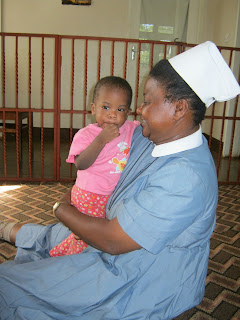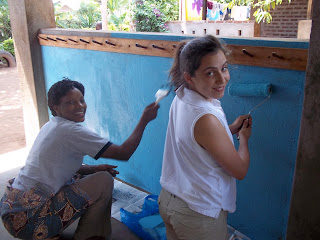I arrived at WEECE for another day of work to find the Ugandan women had headed back home with a notebook full of ideas. I wondered what a normal day in the office might be like, when I noticed there was a buzz of excitement in the air. As the students cleaned, they talked in an animated fashion about something. After the school was declared spotless, they put down their rags, removed their kangas, and gathered in the common area in their uniforms. Here, each day they stood as if at attention while Mama Mrema's long gaze inspected each one.
"Your shirt is not tucked. Why is this button hanging off the skirt? Are we not in a sewing school? (the girls giggled) Please get a needle and thread. Find a comb and fix her hair. You must all respect yourselves if you expect anyone to take you seriously, and it doesn't cost anything but effort."
After morning songs and prayers, Mama makes the announcement they were waiting for.
"Today we begin preparations for graduation."
The two-year vocational school at WEECE teaches Sewing, Computers, Math, English and Social Studies. They operate at a reduced rate for teenage students who would not otherwise be in school. One young girl could not read or write when she first arrived. It's opened to boys as well, and this year there was one boy on the roster. Last year they were not able to have a ceremony, so this would be the first graduation ever held at WEECE. Last year's students would come back for the festivities this year to receive their certificates as well.
For the next week, VICOBA work was put on hold, and there was a flurry of activity at the center. For the students it meant; exams were taken, sewing completed, song and dance rehearsal, and graduation practice. For Abby and me it meant grading exams, helping with rehearsals, reorganizing the Women's Sewing Shop, figuring out a way to display the student's garments, and putting out any figurative fires that flared up. One morning Mama Mrema came in with a big box and had everyone gather around. I don't know how she did it, but somehow she had gotten a donation of caps and gowns for the students! They screamed with delight as she explained what they were as they tried them on. You could see them stand a little taller as at the credibility this gave their accomplishment.
One day as we sat waiting for a delivery for the ceremony, Mama Mrema told the girls about VICOBA. I was shocked to learn they had been there for two years and didn't even know what WEECE was really all about. After some research, I discovered there was a disconnect between the school and the center. It seemed they taught them everything they needed to know to graduate, but missed out on the opportunity to empower them for life as an adult. So I wrote a curriculum for the second year year students. It would be implemented in their final three months at school. It included things such as: A business seminar on bookkeeping, accounts payable, receivable, marketing, best practices. Working for an entire day in the new sewing shop opened at WEECE, for training in how the shop is run. Learning about VICOBA, and visiting a village to see it in action. Conversational English to get them over their fear of speaking English, in which the teacher leads a discussion by asking ten open-ended questions. A class on women's legal rights including marriage, divorce, and inheritance. Have a session on education in local government and civic groups to encourage them to get involved in their community. "Future Plan" class where they each lay out a detailed plan for what will happen in the six weeks after graduation to get them started on their goals. And the biggie: a Senior Sewing Project. In this exercise the student's would learn to think outside the box, which they would hopefully carry into their business or place of work. They must design a completely new project that had not been sewn at WEECE. The teacher must approve their design, a prototype sewn, a cost analysis spreadsheet done on the computer, and a marketing plan laid out, all for a final grade. I am sure those first year students who might speak fondly of me now, will be cursing my name during senior sewing project next November. I wrote this curriculum in such a way that volunteers could come in and teach or lead many of these classes to assist the teacher. I walked into town and made enough copies to last them a few years, (they have no copier) and put them in a binder.
Graduation day finally arrived and I barely recognized the compound. It had been transformed with huge tents for shade, and yards and yards of fabric draped for a podium area. One hundred plastic chairs were placed in the courtyard and the girls tied ribbons on all of them for decoration. Mama Mrema invited the Maasai to come and sing as a performance for graduation. This was the choir she was trying to put together, and it would be their first performance ever. It would also be the first time other Africans had ever been at a function with Maasai present, much less heard them sing.
As in true African fashion, the ceremony started one hour late as we waited for our esteemed guest of honor to arrive, a Member of Parliament from Arusha. It went on for three long hours with speaker after speaker. The entire ceremony was in Kiswahili so I didn't know what was said, but as at any graduation I've ever attended, the students looked hot and more than a little bored. The Maasai went up to perform and there was literally a collective gasp from the crowd when they began to sing in perfect four part harmony. The other Africans seemed surprised that the Maasai actually had a talent, and tears were wiped from some of their eyes as the Maasai sang about being the cast-offs, but were people just like them. The Maasai stood a little taller that day too.
Finally, when no one else stood to speak, the students prepared for their big moment. After walking up to shake hands and receive their certificates, their parents came forward, hugged their children and placed all sorts of lei's around their necks. Colorful necklaces made of flowers or tinsel. Some students did not have family, and I watched as the other girls ran up, hugged them, and placed their lei's around those girls. Whether they understood it or not, for the students, this was a pivotal day. Whatever happens in their life, whatever path they choose, no matter what their living situation, they will always be able to make enough money to eat. They now have proof in their possession that they have learned the valuable skill of sewing, which is a much needed and esteemed trade in Tanzania. WEECE has given them a future.
 |
notice the machine is a foot pump because it does not require electricity
(which is generally not available) |












































































